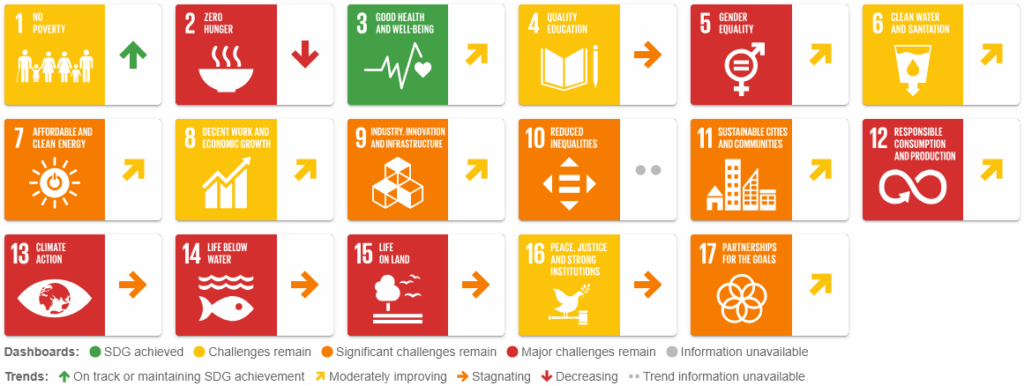In 2015, alongside the adoption of the Paris Agreement at COP21, the United Nations introduced its 2030 Agenda, outlining 17 Sustainable Development Goals (SDGs) to foster a sustainable global society. Japan promptly embraced this framework, launching national campaigns and institutional mechanisms to promote sustainability.
In 2025, Japan ranks 19th in the global SDG Index, down one place from the previous year. While this remains a relatively strong position, key challenges persist, particularly in areas such as gender equality, climate action, resource efficiency, and biodiversity. These issues directly impact the business environment, influencing regulatory expectations, operational risks, and investor confidence.

From a European business perspective, the implementation of sustainability policies in Japan still appears largely symbolic. The widespread use of SDG branding in communications and campaigns is not always matched by regulatory clarity, enforcement, or financial incentives. This creates uncertainty for companies investing in genuinely sustainable practices and limits opportunities for market differentiation.
In energy and climate policy, Japan has yet to send strong and credible signals to support a decisive shift away from fossil fuels. Recent government announcements, such as halting the operation of inefficient coal plants, reiterate existing commitments but lack concrete timelines and mechanisms. Regulatory complexity, limited grid access, and policymaking structures dominated by legacy industry actors further slow the transition.
Japan’s updated Strategic Energy Plan and NDC, which include a 73% emissions reduction target by FY2040, are steps forward. However, credible implementation will require clear planning and better alignment with international best practices, including a more level playing field for businesses offering proven low-carbon solutions including renewable energy.
On corporate disclosure, Japanese companies are increasingly active in frameworks such as CDP, SBTi, TCFD, and TNFD. In fact, Japan currently leads the world in the number of companies registered as early adopters of TNFD, reflecting growing awareness of nature-related financial risks. However, these climate and biodiversity commitments often lack concrete follow-through in terms of governance, risk management, and integration into core business strategy. As global expectations rise, it will be critical to move beyond disclosure and demonstrate measurable outcomes.
In the area of resource use, Japan continues to face high levels of food and plastic waste and lags behind in developing comprehensive circular economy policies. Despite increasing consumer awareness, demand for sustainable products remains relatively low, in part due to limited labeling systems, insufficient regulatory guidance, and lack of public communication. Many European companies are ready to bring experience and innovation to this space, but clearer rules and incentives are needed to unlock their full contribution.
Gender equality also remains a critical issue for the business community. Japan ranked 118th in the World Economic Forum’s 2024 Gender Gap Index, the lowest among developed countries. Structural barriers to women’s leadership and limited progress on work-life balance not only constrain the domestic talent pool but also affect international companies. European firms operating in Japan often face cultural barriers when attempting to implement global DEI standards, including gender equality targets set by their headquarters.
The European Business Council encourages the Japanese government to move from symbolic engagement to more consistent, transparent, and internationally aligned sustainability policies. Doing so will enhance business predictability, improve competitiveness, and create new opportunities for partnership and innovation. The EU-Japan Green Alliance could offer a foundation for advancing these shared priorities through structured public-private cooperation.
Key issues and recommendations
Japan has committed to achieving carbon neutrality by 2050 and improving sustainability performance across sectors. However, from the perspective of European businesses, policy implementation remains uneven, and many government signals fall short of what is needed to ensure market predictability, regulatory clarity, and alignment with international standards.
For companies, both domestic and international, operating in Japan, the lack of robust, science-based frameworks creates uncertainty and limits opportunities to invest in credible, future-proof solutions. Key areas such as renewable energy deployment, sustainability disclosure, gender equality, waste reduction, and climate governance require more ambitious targets, consistent regulation, improved transparency, and stronger enforcement mechanisms.
The EBC believes that moving from symbolic commitments to practical and inclusive strategies will not only support Japan’s decarbonization and SDG goals, but also enhance the country’s competitiveness, innovation capacity, and attractiveness as a business environment. The following recommendations aim to support a transition that is credible, fair, and aligned with international expectations.
-
Published:
Gender Equality at Work
status:
No progress -
Published:
Science-Based Sustainability Education for Adults
status:
New -
Published:
Regulations Against Greenwashing
status:
New -
Published:
Consumer Awareness for Sustainable Food
status:
New -
Published:
Reduction of Food and Plastic Waste
status:
Some progress -
Published:
Strengthening Corporate Sustainability Disclosure
status:
Some progress -
Published:
Nature-Related Risk Disclosure
status:
New -
Published:
Sustainability in Supply Chains
status:
Some progress -
Published:
Renewable Energy Support, Coal Phase Out
status:
Some progress -
Published:
Carbon Pricing
status:
Some progress -
Published:
Transparency and Governance in Energy and Climate Policymaking
status:
New -
Published:
Double Materiality Consideration
status:
New -
Published:
Low-Carbon Transition Plans Disclosure
status:
New -
Published:
Overall sustainability governance
status:
Some progress -
Published:
Climate action, responsible consumption and production
status:
Some progress
Chairman
Mr. Stéfan Le Dû
Founder & General Manager
Studio Ichigo
3-1-6 Motoazabu, Minato-ku, Tokyo 106-0046
www.linkedin.com/in/stefanledu
Upcoming committee meeting schedule
Please contact the EBC ([email protected]) to confirm the meeting location prior to attending
| DATE | TIME | LOCATION |
|---|---|---|
| 2026 | ||
| February 26 (Thuersday) | 1200~ | hybrid |
| May 12 (Tuesday) | 1030~ | hybrid |
| September 1 (Tuesday) | 1030~ | hybrid |
| December 8 (Tuesday) | 1030~ | hybrid |


